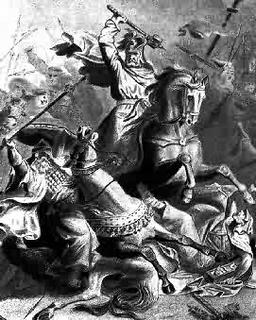High Water.
This is coolbert:
Throughout history, there have been battles fought that have become known as "high water marks" of history.
Among the many battles of history these are some of the noteworthy "high water marks":
Marathon [490 B.C.]. Persian invader defeated by the Greek .
Carrhae [53 B.C.]. Roman invader defeated by the Persians [Parthians].
Teutoburger Wald [9 A.D.]. Roman invader defeated by the Germanic tribesmen.
Poitiers [732 A.D.]. Muslim invader defeated by the massed Frankish army.
Talas [751 A.D.]. Muslim expansionists defeat forces of Tang China expansionism.
Vienna [1683 A.D.]. Turkish invader defeated by coalition forces of Holy Roman Empire and Poland.
In each of the above cases, we see an imperial power, expansionist, reaching a geographic point beyond which they were unable to advance further.
These battles without exception marked a point beyond which no further advance became possible. A "high water mark", that like the oceanic tides, advances, leaves a distinct mark, and then retreats. Cannot go further.
Marathon marked a point beyond the Persian Empire was unable to further advance westward into an area of European cultural domain.
Teutoburger Wald marked a point beyond which the Romans were unable to further advance into central and eastern Europe.
"Quinctilius Varus. Not a household name maybe but he changed the course of history in 9 A.D. His actions led to the frontier of the Roman Empire being on the Rhine rather than the Elbe. The Germanic peoples remained outside the immediate control of Rome and eventually Germanic influxes were responsible for the fall of the Western Empire. Rome was forced to maintain a strong garrison on the Rhine frontier which limited their expansion elsewhere."
Carrhae marked a point beyond which the Romans were unable to further advance eastward into Asia. [Crassus, one of the Roman leaders at the battle, was reputed to be the richest man in the world at the time. Was the man who suppressed the Spartacus rebellion. Was executed by beheading after the battle. The English word crass comes from the name Crassus].
Poitiers marked a point beyond which the Muslim was unable to further advance into France and Europe.

Go here to read what the chroniclers had to say about Poitiers.
Read the Muslim account as written by their chronicler by clicking here.
Talas marked a point beyond which the Tang Empire was unable to further advance westward into central Asia. From this point on the Muslim advanced into lands the Tang Empire had coveted.
"While the battle in itself was of minor importance, its ramifications on the future were very significant. The Arabs were put in a position to extend their Islamic influence throughout central Asia and its silk routes. The T'ang (in China) lost a good amount of power and their westward advance was halted. Muslim shipping in the Indian Ocean improved, which restricted the ocean's contacts with Hindu and Buddhist areas. The Muslims were never able to take control of the Himalayan northern borderlands. Paper manufacturing, an unexpected byproduct from the Battle of Talas, was first spread to Samarkand and Baghdad, then from there carried to Damascus, Cairo, and Morocco, and finally entered Europe through Italy and Spain. This diffusion originated when Chinese prisoners who knew how to make paper, an art discovered in China at least 650 years earlier, were taken by the Arabs at the Talas River. But most importantly, the Battle of Talas led to the An Lushan revolt, which broke out in 755. This rebellion paralyzed China for years and weakened the Tang dynasty until it collapsed a century and a half later."
Vienna marked a point beyond which the Ottomans were unable to advance further into eastern and central Europe.
Go here to see an outstanding photo gallery of paintings highlighting the exploits of the Poles at Vienna. Aspects of the Polish Hussars can be seen in the paintings, including the leopard skin cloaks and the wings the Hussars attached to their uniforms.
The myth man, Joseph Campbell, is most adamant these battles did not only signify a military defeat for one side that had profound consequences, but also a defeat that signified a culture clash. A clash of "civilizations" possessing diametrically opposite values and mores!!
[Speaking here about the defeat of the Muslim invader at Poitiers].
"By 732 it [Islam] was on the point of engulfing France, when there eventuated another of those moments - - as of Marathon and the Maccabees - - when the limit of an East-West-East-West-East pendulation was attained. For as every such moment has shown, there is a point beyond which the character of an invaded major culture province cannot be contravened. And this arrived, this time, in Europe, at the Battle of Poitiers . . . ".
What Campbell is suggesting is that the defeat of the Muslim was not due to merely battlefield numbers, tactics, strategy, motivation, etc. Other factors were at work here. Factors that cannot be overcome by military force alone.
It may very well be that in Iraq, while the U.S. military will be victorious on the battlefield, they will not be able to overcome cultural norms and societal impulses of the Iraqi that will lead to eventual defeat of U.S. aspirations. Defeat not in the battlefield sense, but in a sense of not being able to remake Iraqi society in a manner that violates the basic nature of the Iraqis themselves!!
coolbert.

0 Comments:
Post a Comment
Subscribe to Post Comments [Atom]
<< Home